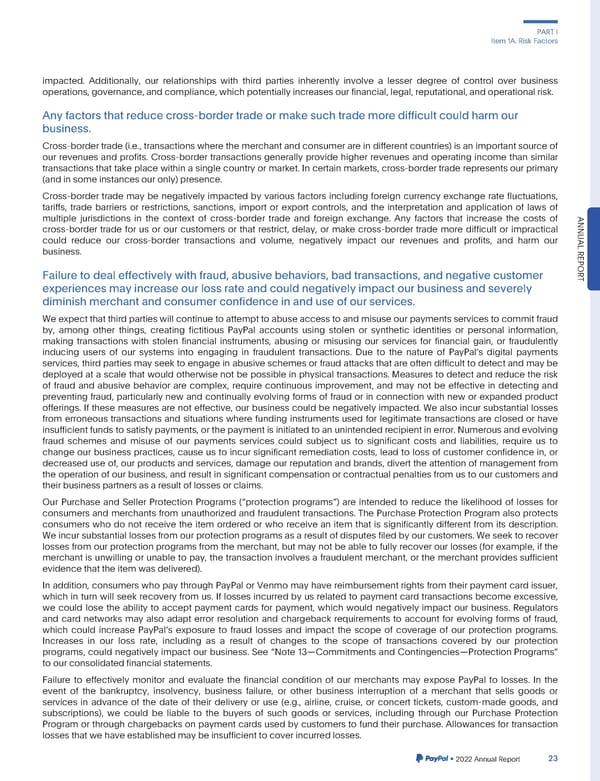PARTI Item1A.RiskFactors impacted. Additionally, our relationships with third parties inherently involve a lesser degree of control over business operations,governance,andcompliance,whichpotentiallyincreasesourfinancial,legal,reputational,andoperationalrisk. Anyfactorsthatreducecross-bordertradeormakesuchtrademoredifficultcouldharmour business. Cross-bordertrade(i.e., transactions where the merchant and consumer are in different countries) is an important source of our revenues and profits. Cross-border transactions generally provide higher revenues and operating income than similar transactions that take place within a single country or market. In certain markets, cross-border trade represents our primary (andinsomeinstancesouronly)presence. Cross-border trade may be negatively impacted by various factors including foreign currency exchange rate fluctuations, tariffs, trade barriers or restrictions, sanctions, import or export controls, and the interpretation and application of laws of multiple jurisdictions in the context of cross-border trade and foreign exchange. Any factors that increase the costs of ANNU cross-border trade for us or our customers or that restrict, delay, or make cross-border trade more difficult or impractical could reduce our cross-border transactions and volume, negatively impact our revenues and profits, and harm our AL business. REPOR Failure to deal effectively with fraud, abusive behaviors, bad transactions, and negative customer T experiencesmayincreaseourlossrateandcouldnegativelyimpactourbusinessandseverely diminishmerchantandconsumerconfidenceinanduseofourservices. Weexpectthatthirdpartieswill continueto attemptto abuseaccessto andmisuseourpaymentsservicestocommitfraud by, among other things, creating fictitious PayPal accounts using stolen or synthetic identities or personal information, making transactions with stolen financial instruments, abusing or misusing our services for financial gain, or fraudulently inducing users of our systems into engaging in fraudulent transactions. Due to the nature of PayPals digital payments services, third parties may seek to engage in abusive schemes or fraud attacks that are often difficult to detect and may be deployed at a scale that would otherwise not be possible in physical transactions. Measures to detect and reduce the risk of fraud and abusive behavior are complex, require continuous improvement, and may not be effective in detecting and preventing fraud, particularly new and continually evolving forms of fraud or in connection with new or expanded product offerings. If these measures are not effective, our business could be negatively impacted. We also incur substantial losses from erroneous transactions and situations where funding instruments used for legitimate transactions are closed or have insufficient funds to satisfy payments, or the payment is initiated to an unintended recipient in error. Numerous and evolving fraud schemes and misuse of our payments services could subject us to significant costs and liabilities, require us to change our business practices, cause us to incur significant remediation costs, lead to loss of customer confidence in, or decreaseduseof, our products and services, damage our reputation and brands, divert the attention of management from the operation of our business, and result in significant compensation or contractual penalties from us to our customers and their business partners as a result of losses or claims. Our Purchase and Seller Protection Programs (“protection programs”) are intended to reduce the likelihood of losses for consumers and merchants from unauthorized and fraudulent transactions. The Purchase Protection Program also protects consumers who do not receive the item ordered or who receive an item that is significantly different from its description. Weincursubstantiallossesfromourprotectionprogramsasaresultofdisputesfiledbyourcustomers.Weseektorecover losses from our protection programs from the merchant, but may not be able to fully recover our losses (for example, if the merchant is unwilling or unable to pay, the transaction involves a fraudulent merchant, or the merchant provides sufficient evidencethattheitemwasdelivered). In addition, consumers who pay through PayPal or Venmo may have reimbursement rights from their payment card issuer, which in turn will seek recovery from us. If losses incurred by us related to payment card transactions become excessive, wecould lose the ability to accept payment cards for payment, which would negatively impact our business. Regulators and card networks may also adapt error resolution and chargeback requirements to account for evolving forms of fraud, which could increase PayPals exposure to fraud losses and impact the scope of coverage of our protection programs. Increases in our loss rate, including as a result of changes to the scope of transactions covered by our protection programs, could negatively impact our business. See “Note 13—Commitments and Contingencies—Protection Programs” to our consolidatedfinancial statements. Failure to effectively monitor and evaluate the financial condition of our merchants may expose PayPal to losses. In the event of the bankruptcy, insolvency, business failure, or other business interruption of a merchant that sells goods or services in advance of the date of their delivery or use (e.g., airline, cruise, or concert tickets, custom-made goods, and subscriptions), we could be liable to the buyers of such goods or services, including through our Purchase Protection Program or through chargebacks on payment cards used by customers to fund their purchase. Allowances for transaction lossesthatwehaveestablishedmaybeinsufficienttocoverincurredlosses. •2022AnnualReport 23
 2023 Annual Report Page 170 Page 172
2023 Annual Report Page 170 Page 172